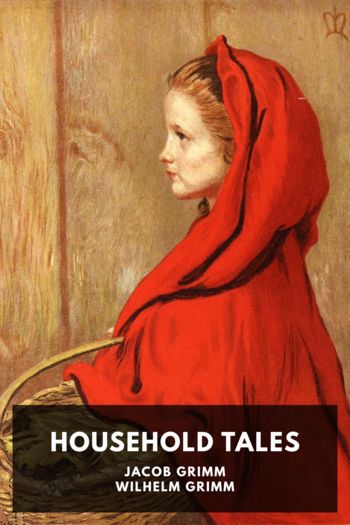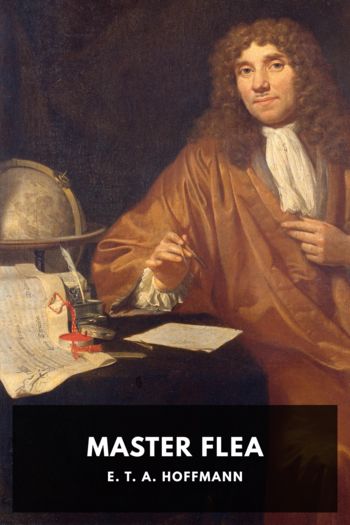Household Tales - Jacob Grimm (read me a book .txt) 📗

- Author: Jacob Grimm
Book online «Household Tales - Jacob Grimm (read me a book .txt) 📗». Author Jacob Grimm
She went up to her father and mother, fell on their necks and kissed them; there was no help for it, they all had to weep for joy. The young count stood near them, and when she perceived him she became as red in the face as a moss-rose, she herself did not know why. The King said, “My dear child, I have given away my kingdom, what shall I give thee?”
“She needs nothing,” said the old woman. “I give her the tears that she has wept on your account; they are precious pearls, finer than those that are found in the sea, and worth more than your whole kingdom, and I give her my little house as payment for her services.” When the old woman had said that, she disappeared from their sight. The walls rattled a little, and when the King and Queen looked round, the little house had changed into a splendid palace, a royal table had been spread, and the servants were running hither and thither.
The story goes still further, but my grandmother, who related it to me, had partly lost her memory, and had forgotten the rest. I shall always believe that the beautiful princess married the count, and that they remained together in the palace, and lived there in all happiness so long as God willed it. Whether the snow-white geese, which were kept near the little hut, were verily young maidens (no one need take offence,) whom the old woman had taken under her protection, and whether they now received their human form again, and stayed as handmaids to the young Queen, I do not exactly know, but I suspect it. This much is certain, that the old woman was no witch, as people thought, but a wise woman, who meant well. Very likely it was she who, at the princess’s birth, gave her the gift of weeping pearls instead of tears. That does not happen nowadays, or else the poor would soon become rich.
Eve’s Various ChildrenWhen Adam and Eve were driven out of Paradise, they were compelled to build a house for themselves on unfruitful ground, and eat their bread in the sweat of their brow. Adam dug up the land, and Eve span. Every year Eve brought a child into the world; but the children were unlike each other, some pretty, and some ugly. After a considerable time had gone by, God sent an angel to them, to announce that he was coming to inspect their household. Eve, delighted that the Lord should be so gracious, cleaned her house diligently, decked it with flowers, and strewed reeds on the floor. Then she brought in her children, but only the beautiful ones. She washed and bathed them, combed their hair, put clean raiment on them, and cautioned them to conduct themselves decorously and modestly in the presence of the Lord. They were to bow down before him civilly, hold out their hands, and to answer his questions modestly and sensibly. The ugly children were, however, not to let themselves be seen. One hid himself beneath the hay, another under the roof, a third in the straw, the fourth in the stove, the fifth in the cellar, the sixth under a tub, the seventh beneath the wine-cask, the eighth under an old fur cloak, the ninth and tenth beneath the cloth out of which she always made their clothes, and the eleventh and twelfth under the leather out of which she cut their shoes. She had scarcely got ready, before there was a knock at the house-door. Adam looked through a chink, and saw that it was the Lord. Adam opened the door respectfully, and the Heavenly Father entered. There, in a row, stood the pretty children, and bowed before him, held out their hands, and knelt down. The Lord, however, began to bless them, laid his hands on the first, and said, “Thou shalt be a powerful king;” and to the second, “Thou a prince,” to the third, “Thou a count,” to the fourth, “Thou a knight,” to the fifth, “Thou a nobleman,” to the sixth, “Thou a burgher,” to the seventh, “Thou a merchant,” to the eighth, “Thou a learned man.” He bestowed upon them also all his richest blessings.
When Eve saw that the Lord was so mild and gracious, she thought, “I will bring hither my ill-favoured children also, it may be that he will bestow his blessing on them likewise.” So she ran and brought them out of the hay, the straw, the stove, and wherever else she had concealed them. Then came the whole coarse, dirty, shabby, sooty band.
The Lord smiled, looked at them all, and said, “I will bless these also.” He laid his hands on the first, and said to him, “Thou shalt be a peasant,” to the second, “Thou a fisherman,” to the third, “Thou a smith,” to the fourth, “Thou a tanner,” to the fifth, “Thou a weaver,” to the sixth, “Thou a shoemaker,” to the seventh, “Thou a tailor,” to the eighth, “Thou a potter,” to the ninth, “Thou a wagoner,” to the tenth, “Thou a sailor,” to the eleventh, “Thou an errand-boy,” to the twelfth, “Thou a scullion all the days of thy life.”
When Eve had heard all this she said, “Lord, how unequally thou dividest thy gifts! After all they are all of them my children, whom I have brought into the world, thy favours should be given to all alike.”
But God answered, “Eve, thou dost not understand. It is right and necessary that the entire world should be supplied from thy children; if they were all princes and lords, who would grow





Comments (0)